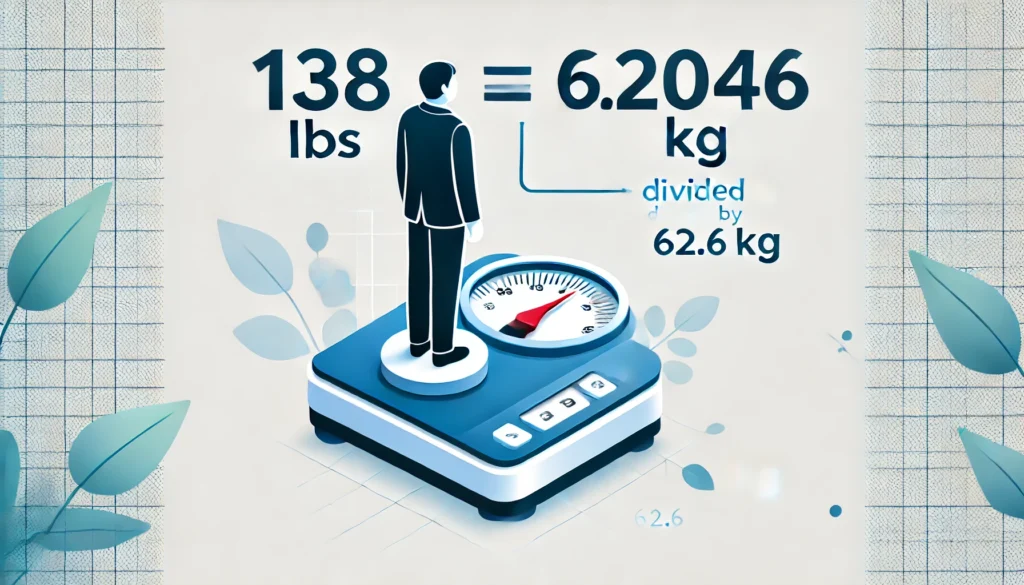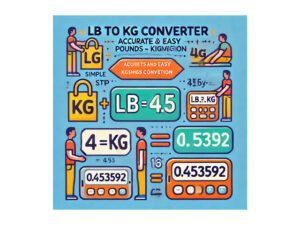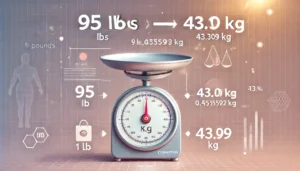When it comes to converting weight measurements, the process of changing pounds (lbs) to kilograms (kg) is a common task. Whether you are tracking your fitness progress, studying for an exam, or simply need to know the equivalent weight, it’s essential to understand the conversion formula. In this article, we will guide you through the process of converting 138 lbs to kg and provide some helpful tips and examples to ensure you grasp the concept easily.
What Does “138 lbs to kg” Mean?
Before diving into the actual conversion, let’s clarify what we are trying to accomplish. The term 138 lbs to kg simply refers to converting a weight of 138 pounds into kilograms. Pounds are a unit of weight primarily used in the United States and some other countries, while kilograms are used internationally, particularly in scientific and metric systems.
Conversion Formula: Pounds to Kilograms
The formula to convert pounds to kilograms is straightforward. You simply divide the number of pounds by 2.2046. Mathematically, this looks like: kg=lbs2.2046\text{kg} = \frac{\text{lbs}}{2.2046}kg=2.2046lbs
For example, to convert 138 lbs to kg, use the following calculation: 138 lbs÷2.2046=62.596 kg138 \, \text{lbs} \div 2.2046 = 62.596 \, \text{kg}138lbs÷2.2046=62.596kg
Thus, 138 lbs is approximately 62.6 kg.
Why Do We Need to Convert Pounds to Kilograms?
The conversion from pounds to kilograms is necessary for a variety of reasons. Internationally, most countries and industries use the metric system, where kilograms are the standard unit for weight. For example, many scientific experiments, health guidelines, and sports activities use kilograms to measure weight and mass.
If you travel, work, or study in a country that uses the metric system, understanding how to convert pounds to kilograms becomes essential. It also helps ensure accurate calculations in nutrition, fitness, and medical contexts.
Practical Examples of 138 lbs in Kilograms
To make the concept clearer, here are a few practical examples where you might need to convert 138 lbs to kg:
- Fitness & Health: If you weigh 138 lbs and want to track your progress in a country that uses the metric system, converting your weight into kilograms is necessary.
- Cooking & Nutrition: Recipes might provide nutritional information in kilograms, so converting your body weight or the weight of ingredients might be necessary.
- Sports: Many athletic competitions and health assessments use kilograms for weight-based categories, so knowing the conversion helps athletes.
Common Conversion Mistakes to Avoid
While converting pounds to kilograms is quite simple, some common mistakes can occur:
- Not Using the Correct Formula: The formula for conversion is essential. Always remember to divide the number of pounds by 2.2046. Using an incorrect formula can lead to inaccurate results.
- Rounding Too Early: It’s tempting to round your answer too soon, but it’s important to maintain precision. For example, instead of rounding immediately, carry out the conversion to the fullest decimal point, then round off as needed at the end of the calculation.
- Confusing Pounds with Ounces: Make sure you are working with pounds and not ounces. Ounces are a smaller unit of weight, and mixing the two could result in a significant error in your calculation.
Conclusion: Converting 138 lbs to kg Made Easy
In conclusion, converting 138 lbs to kg is a simple process using the conversion formula: divide the number of pounds by 2.2046. In this case, 138 lbs is approximately 62.6 kg. With this knowledge, you can easily convert any weight from pounds to kilograms, whether for personal tracking or in a professional setting.
Understanding how to convert between these two units can be invaluable in various contexts such as fitness, travel, and scientific studies. With the provided examples and tips, converting between pounds and kilograms becomes an easy and essential skill to master.





